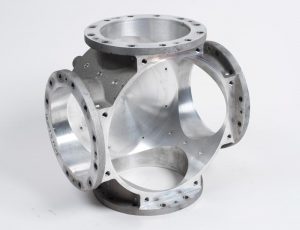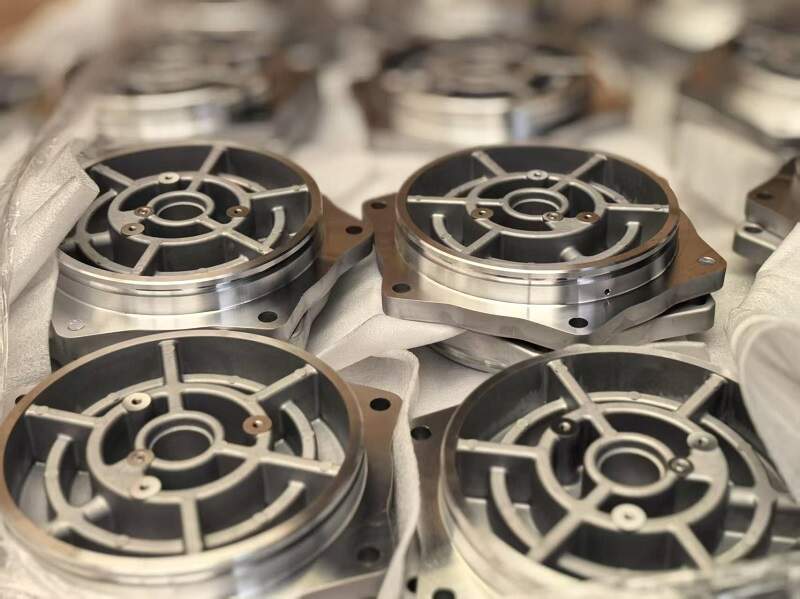The engineering behind every Aluminum Foundry production process
Wiki Article
The Impact of Ingenious Shop Solutions on Lasting Production Practices
Cutting-edge factory services play an important role in advancing sustainable production techniques. By incorporating reusing innovations and energy-efficient procedures, these services substantially decrease ecological impact. Foundries can redeem useful products, therefore decreasing dependancy on virgin resources. As automation and lean manufacturing concepts get traction, manufacturing effectiveness is maximized. The complete level of these innovations and their effects for the future of manufacturing continue to be to be checked out.The Duty of Advanced Recycling Technologies in Foundries
Advanced reusing modern technologies are transforming the landscape of shops by enhancing product recuperation and reducing waste. These innovative processes enable factories to reclaim useful steels and materials from scrap, minimizing dependence on virgin sources. By incorporating sophisticated sorting, shredding, and melting strategies, factories can effectively draw out usable products from discarded items, thereby promoting a circular economy.In addition, these modern technologies sustain the manufacturing of high-quality alloys and parts, making sure that recycled materials meet rigid industry criteria (aluminum casting). Because of this, foundries are not only boosting their product efficiency however likewise reducing the ecological influence related to conventional production approaches
This change towards progressed recycling not only reinforces financial feasibility for shops but likewise lines up with global sustainability objectives. Inevitably, the consolidation of these technologies stands for a considerable step ahead in the pursuit for lasting production techniques within the foundry market.
Power Efficiency: Reducing Usage in Production Processes
Energy performance in manufacturing procedures is crucial for lasting operations. Methods such as process optimization techniques, eco-friendly power combination, and waste heat recovery play vital functions in decreasing power consumption. By concentrating on these areas, suppliers can significantly lower their environmental impact while enhancing productivity.Process Optimization Techniques
A significant number of making centers are progressively adopting procedure optimization techniques to enhance energy performance and reduce usage. These techniques involve examining and refining production process, identifying bottlenecks, and executing automation to streamline operations. By leveraging information analytics, suppliers can keep an eye on power use in real-time, allowing proactive adjustments to lessen waste. Methods such as Lean Manufacturing and Six Sigma concentrate on getting rid of inadequacies and optimizing resource allowance. Furthermore, progressed modern technologies like Internet of Things (IoT) sensors give understandings right into equipment efficiency, facilitating predictive upkeep that protects against energy loss. Overall, these process optimization approaches not only add to lowered energy intake but also promote a culture of constant enhancement within producing settings, straightening operational experiment sustainability goals.Renewable Resource Combination
Lots of manufacturing centers are progressively incorporating renewable resource resources to boost general power efficiency and reduce dependence on standard power grids. This adjustment includes the adoption of solar, wind, and biomass energy, which can substantially lower and lower functional costs carbon footprints. By using these sustainable power sources, manufacturers not just minimize their ecological impact but also enhance power resilience. In addition, integrating eco-friendly energy systems frequently includes advanced innovations such as energy storage and wise grid options, which enhance power use and facilitate real-time tracking. This integration supports manufacturers in accomplishing regulative conformity and conference sustainability goals while cultivating development in manufacturing procedures. Inevitably, renewable resource integration represents a critical change towards more lasting production practices and lasting practicality.Waste Heat Recuperation
Incorporating renewable resource sources establishes the phase for additional developments in power effectiveness, specifically with the execution of waste warm recovery systems. These systems capture excess thermal power generated during manufacturing procedures, which would otherwise be shed to the environment. By repurposing this warm, foundries can considerably minimize their power consumption, reduced functional prices, and decrease their carbon footprint. The recouped heat can be used for various applications, such as heating, power generation, or pre-heating raw products. Because of this, waste warmth healing not just enhances energy performance however likewise adds to a sustainable production model. Ingenious factory services that prioritize this technology are leading the way for an environmentally liable commercial landscape, lining up profitability with ecological stewardship.Utilizing Eco-Friendly Materials in Factory Operations
As the demand for lasting production techniques expands, foundries are increasingly turning to green products to improve their operations. By incorporating sustainable choices, such as recycled steels and bio-based binders, factories can considerably lower their environmental footprint. These products often call for less energy for handling and can reduce damaging emissions during production.The adoption of green products not only straightens with regulatory requirements however additionally fulfills consumer preferences for greener products. Factories are exploring cutting-edge alternatives, such as using natural ingredients that boost mold high quality while remaining safe.
The shift to sustainable materials fosters a circular economy by promoting resource reuse and decreasing waste. Furthermore, this change can improve the total performance of shop procedures, as eco-friendly materials frequently show exceptional residential properties, causing boosted product efficiency - Aluminum Foundry. Eventually, the usage of environmentally friendly products stands for a vital step toward lasting production in the foundry market

Developments in Waste Monitoring and Reduction Techniques
The change towards environment-friendly products in shop operations leads the means for improvements in waste monitoring and reduction strategies. Innovative foundry solutions are increasingly taking on methods that decrease waste generation and promote recycling. Methods such as closed-loop systems allow for the reuse of materials, substantially lowering the volume of waste generated throughout producing procedures. In addition, developments in purification and splitting up modern technologies make it possible for the efficient recovery of valuable spin-offs, which can be reintegrated right into the manufacturing cycle.Furthermore, the application of real-time tracking systems supplies data-driven understandings into waste generation patterns, assisting anonymous in notified decision-making to maximize source usage. Factories are additionally checking out biowaste options, converting organic waste right into energy or functional products, better advertising sustainability. These technologies not only add to a circular economic situation but also enhance the overall ecological performance of shop procedures, highlighting the industry's commitment to decreasing its environmental footprint.
The Effect of Automation on Lasting Manufacturing
While lots of markets go for sustainability, automation becomes a crucial consider boosting lasting production techniques within factories. By integrating automated systems, shops can achieve higher effectiveness, lower waste, and reduced energy consumption. Automated procedures enable specific control over production parameters, lessening flaws and remodel, which in turn preserves sources.In addition, automation promotes the tracking of environmental impacts, making it possible for real-time adjustments that line up with sustainability objectives. Precision aluminum casting. Advanced robotics and expert system can optimize material usage, causing significant reductions in scrap and exhausts
Additionally, automated innovations advertise much safer check my reference workplace by handling dangerous tasks, consequently improving employee well-being while guaranteeing compliance with environmental guidelines. Generally, the adoption of automation within foundries not only streamlines operations however additionally plays a pivotal role ahead of time lasting production techniques, adding to a more liable commercial landscape.
Instance Researches: Effective Execution of Sustainable Shop Practices
Effective execution of sustainable techniques in shops can be illustrated through different study that highlight quantifiable end results and ingenious approaches. One notable example is a mid-sized foundry that embraced a closed-loop water reusing system, minimizing water consumption by 40% and decreasing wastewater generation. In addition, this facility altered to using environment-friendly mold products, which not only improved product top quality however also improved worker security.Another considerable situation involved a big shop incorporating renewable resource resources, such as solar panels, which balance out 30% of its energy requires. This campaign not just decreased operational prices yet likewise added to their explanation a significant reduction in carbon exhausts.
Finally, a factory that executed lean production techniques reported a 25% boost in performance, causing much less material waste and optimized manufacturing processes. These cases jointly emphasize the concrete benefits and sustainability improvements possible with cutting-edge foundry methods.
Regularly Asked Inquiries
Exactly How Do Innovative Foundry Solutions Contribute to General Sustainability Goals?
Ingenious shop services boost overall sustainability objectives by optimizing source use, minimizing waste, and improving energy efficiency. These advancements add to reduce carbon footprints and promote ecologically accountable practices within the production field, sustaining broader sustainability efforts.What Are the Economic Benefits of Taking On Sustainable Shop Practices?
Embracing sustainable foundry techniques can minimize operational costs, boost source efficiency, and improve competitiveness. Additionally, these practices can attract eco-conscious consumers and financiers, ultimately bring about enhanced success and long-lasting economic practicality for companies.Just How Can Little Foundries Carry Out Sustainable Advancements Effectively?
Small foundries can carry out lasting advancements effectively by taking on energy-efficient innovations, optimizing resource usage, training team on lasting techniques, collaborating with distributors for environmentally friendly materials, and taking part in continuous improvement procedures to minimize waste and exhausts.What Qualifications Exist for Lasting Foundry Procedures?

Just How Do Consumer Preferences Impact Sustainable Production in Foundries?
Customer preferences considerably affect lasting production in factories by driving need for environment-friendly items. As consumers prioritize sustainability, factories adjust their methods, incorporating greener modern technologies and materials to satisfy market expectations and boost their affordable advantage.By repurposing this heat, shops can significantly decrease their power consumption, reduced functional costs, and lessen their carbon impact. Foundries are likewise exploring biowaste options, transforming organic waste right into energy or useful materials, further promoting sustainability. By integrating automated systems, shops can accomplish greater effectiveness, reduce waste, and lower power intake. One more considerable instance included a large foundry integrating sustainable power sources, such as solar panels, which balance out 30% of its power needs. Innovative foundry services improve total sustainability objectives by optimizing resource usage, minimizing waste, and boosting power effectiveness.
Report this wiki page